Related Research Articles
The following is a tabulation of United States military casualties of war.
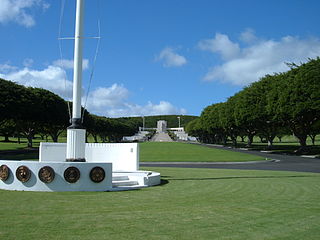
The National Memorial Cemetery of the Pacific is a national cemetery located at Punchbowl Crater in Honolulu, Hawaii. It serves as a memorial to honor those men and women who served in the United States Armed Forces, and those who have given their lives in doing so. It is administered by the National Cemetery Administration of the United States Department of Veterans Affairs and is listed on the National Register of Historic Places. Millions of visitors visit the cemetery each year, and it is one of the most popular tourist attractions in Hawaii.
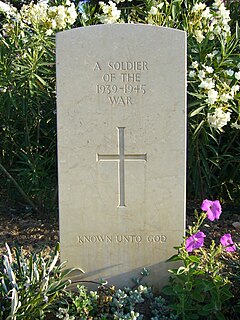
Missing in action (MIA) is a casualty classification assigned to combatants, military chaplains, combat medics, and prisoners of war who are reported missing during wartime or ceasefire. They may have been killed, wounded, captured, executed, or deserted. If deceased, neither their remains nor grave has been positively identified. Becoming MIA has been an occupational risk for as long as there has been warfare.

The Joint POW/MIA Accounting Command was a joint task force within the United States Department of Defense (DoD) whose mission was to account for Americans who are listed as Prisoners of War (POW), or Missing in Action (MIA), from all past wars and conflicts. It was especially visible in conjunction with the Vietnam War POW/MIA issue. The mission of the Joint POW/MIA Accounting Command was to achieve the fullest possible accounting of all Americans missing as a result of the nation's past conflicts. The motto of JPAC was "Until they are home".
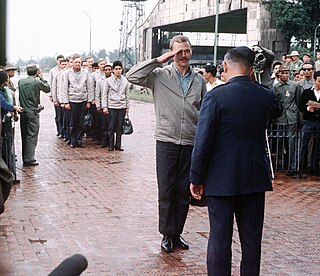
Operation Homecoming was the return of 591 American prisoners of war (POWs) held by North Vietnam following the Paris Peace Accords that ended U.S. involvement in the Vietnam War.
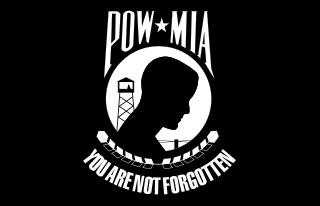
The National League of Families of American Prisoners and Missing in Southeast Asia, commonly known as the National League of POW/MIA Families or the League, is an American 501(c)(3) humanitarian organization that is concerned with the Vietnam War POW/MIA issue. According to the group's web site, its sole purpose is "to obtain the release of all prisoners, the fullest possible accounting for the missing and repatriation of all recoverable remains of those who died serving our nation during the Vietnam War in Southeast Asia." The League's most prominent symbol is its famous flag.

The National League of Families POW/MIA flag, often referred to as the POW/MIA flag, was adopted in 1972 and consists of the official emblem of the National League of Families of American Prisoners and Missing in Southeast Asia in white on a black background. In 2019 the National POW/MIA Flag Act was signed into law, requiring the POW/MIA flag to be flown on certain federal properties, including the U.S. Capitol Building, on all days the U.S. flag is flown.
The U.S.–Russia Joint Commission on POWs/MIAs (USRJC) was established in 1992 by the presidents of the United States and the Russian Federation, George H. W. Bush and Boris Yeltsin. The USRJC was established to determine the fates of the United States's and the Soviet Union's unaccounted-for service personnel from World War II, the Korean War, the Cold War, Afghanistan and the Vietnam War, Laos and Cambodia.
The Senate Select Committee on POW/MIA Affairs was a special committee convened by the United States Senate during the George H. W. Bush administration to investigate the Vietnam War POW/MIA issue, that is, the fate of United States service personnel listed as missing in action during the Vietnam War. The committee was in existence from August 2, 1991 to January 2, 1993.
The Vietnam War POW/MIA issue concerns the fate of United States servicemen who were reported as missing in action (MIA) during the Vietnam War and associated theaters of operation in Southeast Asia. The term also refers to issues related to the treatment of affected family members by the governments involved in these conflicts. Following the Paris Peace Accords of 1973, 591 U.S. prisoners of war (POWs) were returned during Operation Homecoming. The United States listed about 2,500 Americans as prisoners of war or missing in action but only 1,200 Americans were reported to have been killed in action with no body recovered. Many of these were airmen who were shot down over North Vietnam or Laos. Investigations of these incidents have involved determining whether the men involved survived being shot down. If they did not survive, then the U.S. government considered efforts to recover their remains. POW/MIA activists played a role in pushing the U.S. government to improve its efforts in resolving the fates of these missing service members. Progress in doing so was slow until the mid-1980s when relations between the United States and Vietnam began to improve and more cooperative efforts were undertaken. Normalization of the U.S. relations with Vietnam in the mid-1990s was a culmination of this process.
In the United States, National POW/MIA Recognition Day is observed on the third Friday in September. It honors those who were prisoners of war (POWs) and those who are still missing in action (MIA). It is most associated with those who were POWs during the Vietnam War. National Vietnam War Veterans Day is March 29, the date in 1973 when the last US combat troops departed the Republic of Vietnam.
United States Navy Ensign Robert Warren Langwell, of Columbus, Indiana was declared missing in action during the Korean War. His body was recovered in 2008 by the Republic of Korea's Ministry of National Defense Agency for Killed in Action Recovery and Identification (MAKRI) who which sent them to Joint POW/MIA Accounting Command (JPAC) for analysis. Among other forensic identification tools and circumstantial evidence, JPAC scientists used dental comparisons in the identification of Langwell's remains which are to be buried with full military honors in Arlington National Cemetery on July 12, 2010.

The Defense POW/MIA Accounting Agency (DPAA) is an agency within the U.S. Department of Defense whose mission is to recover American military personnel listed as prisoners of war (POW) or missing in action (MIA) from designated past conflicts, from countries around the world.
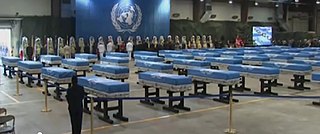
The recovery of US human remains from the Korean War has continued since the end of the war.
References
- ↑ Cha, Victor D. (2013). The Impossible State: North Korea, Past and Future. Internet Archive. New York: Ecco. pp. 282–283. ISBN 978-0-06-199850-8. LCCN 2012009517. OCLC 1244862785.
